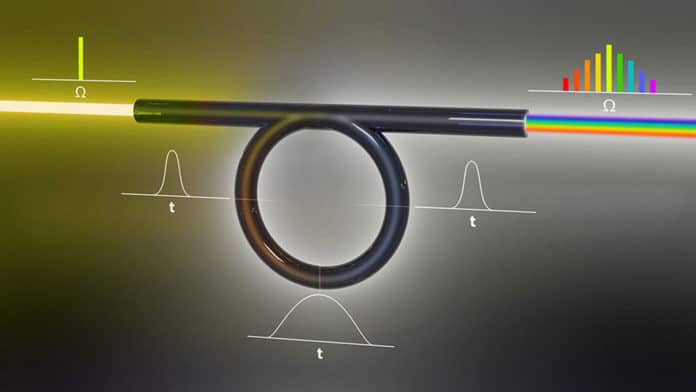Scientists at the University of Rochester have developed a new device called stretched-pulse soliton Kerr resonator to produce ultrafast laser pulses over a broader range of wavelengths. The device can enhance the performance of ultrafast laser pulses.
The device generates ultrafast laser pulse—on the order of femtoseconds, or one quadrillionth of a second. This is the shortest pulse ever from a gain-free fiber source.
William Renninger, Assistant Professor of Optics, said, “The work has important implications for a range of engineering and biomedical applications, including spectroscopy, frequency synthesis, distance ranging, pulse generation, and others.”
Kerr resonators support novel nonlinear wave phenomena, including technologically important optical solitons. Fiber Kerr resonator solitons enable wavelength and repetition-rate versatile femtosecond-pulse and frequency-comb generation. However, key performance parameters, such as pulse duration, lag behind those from traditional mode-locked laser-based sources.
In this study, scientists presented new pulse generation in dispersion-managed Kerr resonators based on stretched-pulse solitons, which support the shortest pulses to date from a fiber Kerr resonator. They discovered a new soliton—a short burst or localized envelope of a wave—that maintains its shape while propagating at a constant velocity. The solitons generated in Renninger’s device differ from the solitons in other Kerr resonators, specifically in the shape and behavior of the stretching pulses they create.
Renninger said, “It is stable in the sense it keeps repeating the same thing over and over, getting longer, then shorter, longer then shorter. The pulses feature a broad spectral bandwidth and a compressed pulse duration of 210 femtoseconds, which is the shortest pulse duration observed to date from fiber Kerr resonators.”
Xue Dong is the lead author of the study. Other coauthors of the study include Qian Yang and Christopher Spiess, also graduate research associates in the lab, and Victor Bucklew, a former postdoctoral associate in the lab.
Journal Reference:
- Xue Dong et al. Stretched-Pulse Soliton Kerr Resonators. DOI: 10.1103/PhysRevLett.125.033902
